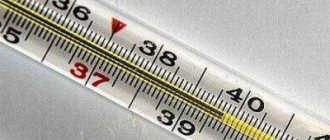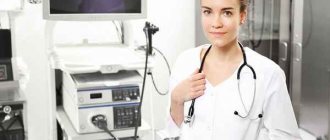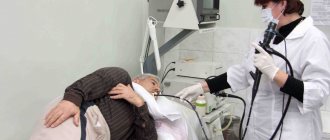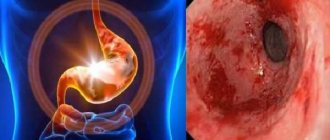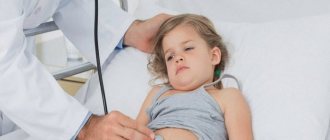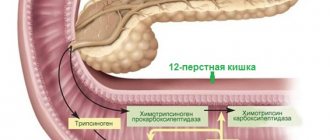Rotavirus infection or “intestinal flu” is caused by a pathogen of the genus of viruses from the Rotavirus family and is characterized by signs of general intoxication. The patient experiences an increase in body temperature, diarrhea, episodes of vomiting, weakness, and fatigue. How long diarrhea due to rotavirus in a child can last depends on the state of the baby’s immune system and the strain of the pathogen.
Duration of diarrhea due to rotavirus in a child
Professional skills: Colon hydrotherapy, treatment of gastrointestinal diseases
Rotavirus infection or “intestinal flu” is caused by a pathogen of the genus of viruses from the Rotavirus family and is characterized by signs of general intoxication. The patient experiences an increase in body temperature, diarrhea, episodes of vomiting, weakness, and fatigue. How long diarrhea due to rotavirus in a child can last depends on the state of the baby’s immune system and the strain of the pathogen.
The risk group includes persons of any gender and any age category. But most often, rotavirus infection, which causes diarrhea, affects young children under 2 years of age. In adult patients, the disorder occurs as a result of contact with a sick child. There are not very many possible causes of the disease, but they all lead to nausea, vomiting, and diarrhea.
Factors that provoke infection include:
- Consuming dirty foods or raw/contaminated water.
- Eating food prepared in violation of heat treatment rules.
- Lack of hygiene.
- Contact with a sick person.
You can get infected anywhere. The main routes of transmission are fecal-oral. Rotavirus survives at low temperatures and retains the ability to be active and reproduce even after prolonged exposure to the refrigerator. It is also possible that the body may be damaged by airborne droplets. When you sneeze, droplets of mucus enter the air and people susceptible to the disease become infected.
Therapy for rotavirus infection
Rotavirus infection does not require specific treatment. The body itself will be able to cope with this pathology within 5-7 days. The main goal of therapy in this case is to try to relieve symptoms, support the body and normalize the functioning of the gastrointestinal tract after stressful situations.
To prevent dehydration during an infectious disease, you need to drink as much water as possible, about 2 liters per day. In order not to provoke vomiting by drinking too much, you need to give the patient 1 spoon every 5 minutes. If signs of dehydration have made themselves felt, solutions prepared on the basis of drugs such as Regidron or Citroglucosalan will help normalize the body’s electrolyte balance.
To reduce intoxication, sorbents are prescribed - activated carbon, Enterosgel, Sorbex.
Body temperature can be reduced by taking antipyretics. However, you need to take medications when the thermometer is 38 degrees or higher. Rotovirus dies at this temperature; if it is brought down at low levels, an environment will be created for its normal further reproduction).
If you have severe pain in the abdomen, you can take 1 tablet of no-shpa, as a rule, this is enough for the pain to go away.
To normalize the intestinal microflora, the patient is prescribed medications that contain enzymes (Linex). You should also adhere to a light diet based on chemical, thermal and mechanical sparing. Restorative therapy is carried out over 2-3 weeks.
You need to know that rotavirus infection cannot be treated with antibiotics; lipoferons, which have an antiviral effect, can be prescribed.
After a short amount of time after the infection, the body recovers completely; the rotavirus does not become chronic.
If treatment for intestinal flu begins in a timely manner, then in the near future you can expect a positive result and the disease will pass in the shortest possible time. If the infection starts, there is a risk of developing various complications.
https://youtu.be/Qt7TUuADHmo
Symptoms
You can tell that diarrhea is caused by rotavirus based on certain symptoms. For example, food poisoning, unlike this disease, develops rapidly, and similar signs of the disease appear in all people who have eaten the same food.
Symptoms of rotavirus infection are generally similar to the flu. There is a certain pattern of disease development:
- Incubation period . On average it ranges from 15 hours to 6 days.
- Initial . At this stage of the disease, the throat becomes inflamed, a wet cough, and conjunctivitis are possible.
- Spicy . Lasts about five days. The most striking sign of rotavirus infection in children is vomiting and diarrhea. The baby becomes lethargic, capricious, and loses his appetite. Loose stools after the onset of rotavirus are watery, foamy, and have a repulsive odor. There may be mucus in the stool. With a mild course of the disease, the stool takes on a mushy consistency. Often, diarrhea caused by rotavirus infection is accompanied by painful, pulling sensations in the stomach, and loud rumbling.
- Intoxication . It usually starts on the third to fifth day. In this case, impotence, weakness, drowsiness and other signs of poisoning are observed.
- Recovery . Lasts one or two days.
Rotavirus is a seasonal disease and, in addition to an eating disorder, is accompanied by respiratory symptoms. Stool and urine change color (urine becomes dark, sometimes with blood, and stool becomes grayish-yellow). How long diarrhea that begins with an intestinal infection will last will depend on the age category of the patient and the general condition of the body. If medical attention is not provided, diarrhea syndrome can last a month.
Important! Repeated loose stools can lead to dehydration (dehydration), which is very dangerous for children.
What not to do
Gastric lavage - during this procedure, normal microflora is washed out, which helps fight the virus that causes diarrhea during an intestinal infection. Flushing the stomach is indicated only in case of prolonged vomiting.
Use medications to stop diarrhea
On average, diarrhea lasts 7 days – it clears the virus. If you stop diarrhea and vomiting at the onset of the disease, the infection will remain inside the patient and continue its toxic effect.
Trying to feed a child against his will
During a period of weakening of the body, food puts stress on the intestines. If children develop an appetite, offer easily digestible foods.
Diagnostics
Worsening of the condition may be associated with other infections, which can cause diarrhea and vomiting. Therefore, to accurately diagnose the disease, the symptoms that appear are not enough. To know how to stop diarrhea, you first need to undergo a series of tests:
- Stool microscopy to determine the presence of the virus.
- Serological testing of blood serum, identifying specific antibodies.
Within a few hours the result comes, allowing you to prescribe adequate treatment. You can purchase a special test for your home first aid kit and perform it if alarming symptoms appear. But the final diagnosis must be made by a doctor, especially when it comes to young patients. He will tell you what to give your child for diarrhea due to rotavirus.
Therapeutic measures
It should be noted that there are no special drugs for the treatment of rotavirus. Therapy must be comprehensive. Diarrhea due to rotavirus is dangerous because it can cause dehydration, so it must be eliminated as soon as possible. The second unpleasant aspect of the disorder is general intoxication, which must be combated simultaneously with diarrhea syndrome.
- Enterosorbents , absorbing toxic substances produced by rotavirus infection. They not only cleanse the body, but also restore damaged mucous membranes and prevent viral cells from attaching to the intestinal walls.
- Enzymes that restore the functioning of the digestive system.
- Antimicrobial agents in the presence of blood in the stool, which means the addition of bacteria, as the body becomes more vulnerable.
- Electrolytes that stabilize water-salt balance. To prevent dehydration, you need to drink constantly, especially when diarrhea, which is provoked by rotavirus, lasts for a long time. In the first days, the child should be given water or saline solutions, for example, Regidron. It is diluted in a liter of water and drunk in small sips so as not to vomit too much. Also, when treating diarrhea, you can use the following remedy: 2 tablespoons of granulated sugar, 1 tablespoon of baking soda, 1 teaspoon of table salt, grapefruit juice mixed and dissolved in a liter of water. Take 2-3 sips every half hour. Infants can be given water from a small spoon or from a syringe.
- Antipyretics . If a high temperature appears with diarrhea due to rotavirus infection, then in such cases give Ibuprofen, Nurofen.
- Antidiarrheal medications that stop diarrhea in a child after rotavirus, for example, Loperamide, Imodium.
The baby may be admitted to a hospital where medications are administered intravenously when diarrhea due to rotavirus does not go away for too long. The patient is prescribed:
- Symbiotics - they allow you to establish intestinal microflora in the shortest possible time.
- Antiviral drugs are drugs that shorten the duration of the disease.
Folk recipes
To make diarrhea go away faster after rotavirus infection, you can use traditional medicine. For this, healing decoctions and infusions are prepared:
- A drink made from chamomile flowers and mint leaves. The raw materials are steamed with boiling water and left for half an hour.
- The fruits of blackberries, bird cherry and blueberries are poured with boiling water, infused and given to the child to drink throughout the day.
- Pour a teaspoon of St. John's wort into a glass of boiling water and wait 1-2 hours. Give the patient 100 ml before meals.
If a child has rotavirus and diarrhea, the stomach should not be washed. During this manipulation, the beneficial intestinal microflora is washed away. Doctors recommend resorting to a cleansing procedure in case of persistent vomiting.
Rotavirus can be weakened by changing your diet. Need to exclude:
- Dairy drinks.
- Plant food.
- Floury, sweet.
- Salted, fried.
- Fatty broths.
Nutrition should be easily digestible. It is better for nursing mothers not to stop breastfeeding during this period (unless the doctor recommends a temporary interruption of breastfeeding to stabilize the baby's condition).
Preventive measures
In order to protect yourself and your family from possible infection, you need to take the following measures:
- Keep your hands and products clean. Infection often occurs through drinking contaminated tap water. Prevention in this case is to boil water before drinking. After visiting the toilet or outside, before eating, you need to wash your hands well with soap. After washing fruits with plain water, it is advisable to pour boiling water over them. Particular attention should be given to young children. Toys, pacifiers, bottles should be kept clean and periodically doused with boiling water.
- Vaccination of the population. Preventive antiviral vaccination is carried out only in European countries and the USA; the Rotacrix vaccine is officially registered in our country. It is recommended that the vaccine be given to children between 6 and 24 weeks of age. For the full course, the procedure must be repeated after 1 month. Vaccination provides 80% protection against rotavirus infection and 100% protection against its complications.
- Isolation of patients. If a person gets sick, he should be isolated from the source of inflammation for 10-15 days. When there are many cases of illness among children, quarantine is introduced in kindergartens and educational institutions. At the slightest manifestation of the disease in adults, it is better to stay home to prevent a mass epidemic.
- Development of immunity. In the body of a person who has had an infection, special antibodies are formed that persist for 1-2 years. These antibodies protect the body from repeated cases of illness caused by a specific serotype of the virus. This protection does not provide a 100% guarantee. After 1 year, you can get sick with the same serotype of rotavirus infection. But, if infection occurs twice, then more stable immunity is developed for 2-3 years.
Rotavirus infection is a very unpleasant disease. However, with timely treatment, his prognosis is very favorable and recovery will not take long.
otravynet.ru
forum.ykt.ru
Symptoms of diarrhea due to rotavirus in a child
Rotavirus infection has several names: intestinal flu, stomach flu, rotavirus enteritis. Under powerful magnification, the causative virus looks like a wheel.
Rotavirus infection in children is expressed by the following symptoms:
- High body temperature, up to 38-39 degrees.
- Attacks of nausea.
- Diarrhea, characterized by loose green stools.
- Vomiting reflex.
Rotavirus enteritis is caused by an infection that enters the lumen of the small intestine. There the pathogen lives an incubation period, during which it does not manifest itself. The duration of the interval from infection with an infectious pathology to the onset of symptoms depends on the human immune system and the number of pathogens that have penetrated the intestinal tract. It takes 3-5 days for rotavirus to reproduce and accumulate. The release of viral particles begins when the disease shows its first signs. Until this moment, a person cannot transmit the infection by airborne droplets.
Symptoms of rotavirus begin with acute respiratory viral infection, followed by diarrhea after a while. Without proper treatment, the duration of the disease is prolonged several times. The child experiences discomfort in the abdominal area, becomes lethargic and weak.
In what case is it necessary to “bring down” the elevated temperature?
If the baby’s temperature level remains up to 38 degrees, then you need to try not to knock it down, this will make it easier for the pediatrician to identify the cause of the malfunction. It is necessary to take into account that the use of the drugs Cefekon-M, Analgin and Antipirin by children is prohibited (for 20 years). The main antipyretic that is usually prescribed to a baby is Paracetamol (even if the illness lasts six days or more). Nurofen and Ibuklin are good medicines for children.
Special attention should be paid to the increase in temperature in children with nervous disorders or cardiovascular diseases. In the presence of such pathologies, it is necessary to reduce the temperature immediately when it reaches 38 degrees, otherwise convulsions may occur.
How many days does diarrhea with rotavirus last?
The duration of the disease is 4-5 days. In severe cases, diarrhea goes away within 10-12 days. When the disease is acute, with severe pain and vomiting, the patient must be taken to the hospital. Typically, acute abdomen syndrome is diagnosed, which occurs as a complication of rotavirus infection. About 30% of cases of intestinal damage can be completely asymptomatic.
Diarrhea in the case of rotavirus in a child occurs almost immediately. The stool changes consistency, becomes liquid, sometimes foams, and has a characteristic sour odor. The volume of bowel movements is small and frequent, up to 10 times a day. It is difficult to feed the baby, he loses a large amount of fluid, and there is a risk of dehydration.
The child may feel nauseous, the intestines are irritated, and the urge occurs even after a sip of water. Diarrhea due to rotavirus in children can reach up to 15 bowel movements per day, which indicates a massive infection that can lead to dehydration. It is important to consult a doctor in a timely manner for qualified help.
Causes
The most common causes of rotavirus infection are:
- Eating dirty or poorly washed fruits and vegetables.
- Dirty water taken for drinking, as well as raw water.
- Ingestion of food products that have undergone poor heat treatment, as well as undercooked or undercooked foods.
- Failure of the sick person to comply with the rules of hygiene procedures.
- Swimming in highly polluted waters.
As a rule, one reason is enough for rotaviruses to enter the patient’s body. In some cases, a combination of several types of infectious lesions is possible, due to the combination of several different causes.
What to feed your baby
If you have rotavirus, you need to feed your child properly. Diet and simplified nutrition is a necessary means of treating the disease. During an exacerbation, the baby’s gastrointestinal tract is weakened and exhausted by constant painful bowel movements, so food should be easily digestible. Rice and some vegetables have strengthening properties. Fermented milk products should be avoided; they promote the growth of bacteria.
If a child is breastfed, you cannot stop it! Pediatricians advise putting the baby to the breast more often. This does not contribute to increased urge; on the contrary, breast milk makes bowel movements easier. In some cases, intestinal flu causes lactose intolerance; mother's milk is not digested in the baby's stomach. In such a situation, it is recommended to use dairy-free formulas and reduce breastfeeding to 2 times a day. After recovery, the infant can again drink mother's milk.
The following products help stop diarrhea in children aged 1 year and older:
- The main diet should be porridge-like soups; food should be offered to the baby exclusively in pureed form. This allows food to be digested easier and faster. Light tea or blueberry juice will help restore water balance. All food should be provided to the baby at a comfortable warm temperature.
- Stale crackers - sweet pastries and fresh bread should be avoided.
- Boiled eggs, porridge with rice or semolina water.
- Fish rich in Omega-3 fatty acids is welcome, but not fried. The meat should be boiled and lightly salted.
After the critical moment has passed, it is forbidden to abruptly interrupt the diet, this is fraught with relapse and abdominal pain. It is advisable to switch to a simplified diet, which includes:
- dried bread;
- vegetable broth soups;
- mashed potatoes in moderation, you should not abuse them, potatoes are rich in starch;
- from vegetables: beets, carrots, tomatoes and cauliflower;
- Seasonal berries and fruits should be given with caution, in small dosages, observing the body’s reaction.
Nutritional therapy helps treat an infectious disease with a high probability of success, since rotavirus affects the digestive system. Diet can relieve the severity of the disease, shorten the duration of the disease, and prevent the inflammatory process.
Infants are susceptible to abdominal pain and flatulence; it is better to exclude infants from the diet during illness. Digestion is restored within 21 days; it is necessary to interrupt the diet after a month and gradually. During this period, exclude:
- Fresh baked goods.
- Fatty foods, including fatty broths and soups.
- Sausages, salted and smoked fish.
- Canned food.
- Cheese, due to its poor digestibility.
- Pasta and pearl barley.
Treatment of diarrhea due to rotavirus
In most cases, diarrhea can be treated at home; in advanced cases, hospitalization is required. Therapy for rotavirus infection consists of the following methods:
- Following a diet that allows you not to strain your weakened stomach. The advantage is light food that does not stimulate the digestive system.
- Elimination of rotavirus by taking sorbents. For infants, the dosage is selected individually. There are different forms of enterosorbents: gels, syrups, tablets. Using the selection method, a convenient release form is selected.
- Replenishing water balance. Dehydration and intoxication must be completely eliminated, or at best prevented. If it is impossible to use drugs that restore the water-salt balance, you can prepare a decoction yourself.
- Restoring intestinal function. After damage caused by an infectious agent, the digestive tract needs to restore beneficial bacteria.
Try to change your baby's diapers and diapers regularly, giving the skin a chance to rest and prevent irritation. Infants are not yet able to report their condition; all responsibility lies with the parents, who are obliged to monitor the baby’s activity.
Which is better: enterol or enterofuril for diarrhea
There is a wide choice of anti-diarrhea medications. The groups of drugs prescribed for children are often similar to those for adults. The main difference will be the dosage, which only a competent pediatrician can select. It is prohibited to independently take out the daily dosage of medication for a child.
These two antidiarrheal and antimicrobial agents normalize the intestinal microflora. Medicines belong to the class of probiotics and contain live but weakened microorganisms. When ingested, they are activated.
The main component of the drug Enterol is not bacteria, but fungi that can suppress the activity of pathogenic microbes. The drugs are different. When diarrhea is infectious and accompanied by fever, it is better to use enterofuril. It can enhance the effect of antibiotics. For non-infectious diarrhea, enterol is used; it restores the intestinal microflora.
Possible complications
Rotavirus infection in early childhood is fraught with many complications. These include:
- Dehydration of the body. The condition occurs due to the large loss of fluid that occurs due to vomiting and diarrhea. Dehydration is dangerous for the baby, even fatal. The consequences can be prevented by restoring the water-salt balance; if the baby refuses to drink, the solution is administered intravenously.
- Acetonemic syndrome, in which metabolism is disrupted. Acetone accumulates in the blood, which provokes vomiting, intoxication and abdominal pain.
- Convulsions - occur against a background of elevated temperature and loss of electrolytes.
- Damage to the nervous system, manifested by fainting and delirium. Such a reaction of the body to toxins causes a convulsive state even at low temperatures.
It is important to provide your baby with timely medical care.
How does infection occur?
Rotavirus (intestinal flu) is a microbial provocateur from a group of viruses. It is invulnerable to external factors and is retained for a long time in water, on food, and various objects. The virus is not susceptible to low temperatures, so it is strongly observed in children in autumn and winter.
The cause of infectious rotavirus is a sick person. A significant amount of the virus is observed in patients with severe clinical manifestations of the disease, as well as in people who are already recovering. The spread of rotavirus can last 2-3 weeks, during which time the patient is dangerous to others.
Rotavirus infection occurs due to:
- direct contact with an infected person;
- eating poorly washed vegetables and fruits;
- drinking raw tap water;
- swimming in polluted lakes and reservoirs;
- failure of the patient to comply with hygiene rules;
- insufficient heat treatment of products.
It is almost impossible to avoid infection with rotavirus. The infection is widespread everywhere, children often get sick, and they have a hard time suffering from the disease. If a child is in a group, group outbreaks occur. After recovery, a person receives short-term immunity, and re-infection is acceptable after a couple of months.
Symptoms of rotavirus infection in young children are caused by impaired absorption in the gastrointestinal tract and excessive release of electrolytes and fluid into the intestinal space.
It is difficult to guess how long the incubation period of rotavirus lasts; it is individual for each person, the average number does not exceed 7 days. Symptoms of intestinal flu develop very quickly, appearing already on the second day of illness.
Rotavirus in a child manifests itself with the following symptoms:
- vomiting and diarrhea are the most important symptoms of the virus;
- intoxication of the body: malaise, loss of appetite;
- the temperature with rotavirus reaches subfebrile levels, very rarely it can be high;
- mild pain, bloating in the abdomen.
It is precisely diarrhea and change in the color of stool during rotavirus infection that become one of the important diagnostic indicators. Human feces have a copious liquid character, sometimes with an unpleasant aroma, and are orange or yellow in color. Frequent vomiting and watery stools lead to dehydration.
In children under 7 years of age, although rare, the following may appear due to rotavirus:
- redness of the throat mucosa, soreness;
- conjunctivitis;
- nasal congestion;
- decreased blood pressure;
- cardiopalmus;
- dry mucous membranes;
- decreased amount of urination.
Such signs require urgent hospitalization of the child and the necessary assistance. With rotavirus, diarrhea lasts from 1 day to a whole week.
Consequences of rotavirus infection
Most often, the infectious process ends with the patient’s complete recovery. The number of complications of the disease is associated with improper treatment, as a result of which bacteria can join viruses. When the body is dehydrated, problems with the functioning of the kidneys, heart, stomach and intestines can be determined. This must be given special attention and kept under constant control and observation.
Some time must pass until the intestinal microflora is restored. In addition, in those who have recovered from this disease, their overall immunity decreases. Therefore, in the first time after rotavirus infection, he remains too susceptible to any diseases. This is especially true for kids.
After suffering from the disease, you can become infected again and develop this disease. They get sick with rotavirus infection again and again when a person was able to become infected with another serotype of the virus. Not many recovered people can boast of lasting immunity against rotavirus.
Diagnostics
Basically, the diagnosis is determined by the doctor without conducting any kind of research. A rotavirus specialist can send a patient for testing:
- blood and urine tests;
- coprogram;
- bacteriological analysis of stool to study microbial changes;
- rapid test (for the presence of viruses);
- in case of severe dehydration, the electrolyte composition of the blood is produced.
Due to the implementation of these diagnostic methods, other infectious diseases with similar symptoms are excluded.
Therapy for diarrhea in patients of different ages is practically no different, with the only exception being breastfed infants.
Therapeutic measures for rotavirus infection and diarrhea are complex, aimed at eliminating certain present symptoms. There are no special drugs to destroy the virus. Medicines, herbal medicine and dietary nutrition help get rid of the disease.
Drug treatment
The duration of diarrhea is affected by the treatment started. The doctor prescribes medications to help cope with the symptoms of rotavirus:
- Antimicrobials (Enterofuril, Metronidazole, Tsiprolet) - if a person has bloody stools, such medications are used. This manifestation indicates the addition of a bacterial infection, then antibiotics cannot be avoided.
- Enterosorbents (Polysorb, Polyphepan, Smecta) - remove toxic substances from the body, inhibit the attachment of the virus to the intestinal mucosa.
- Electrolytes (Regidron) - the product is diluted in liquid and should be taken in small sips. If rotavirus causes diarrhea that lasts for 5 days, the drug will help reduce water loss from the body.
- Enzymes (Festal, Mezim) - normalize the digestive system.
- Antiviral (Arbidol, Kagocel) - reduce the time of diarrhea.
- Prebiotics, probiotics (Bactistatin, Bifiform, Maxilak) – improve the microflora in the intestines.
A patient with rotavirus needs to drink a lot of fluid to avoid dehydration, at least 2.5 liters per day. You should also take chamomile infusions, loosely brewed tea, and compotes.
To restore the body after rotavirus in children and adults, you will need a special diet. For diarrhea and vomiting, products with a strengthening effect are used. You need to exclude milk and its products, which promote the growth of bacteria. Breastfed children should continue to be fed mother's milk.
A child's food for rotavirus should not contain:
- sweets (sweets, chocolate);
- Rye bread;
- legumes;
- soda;
- fresh fruits, vegetables;
- cheese, sausage;
- canned food, pasta.
It is good to eat rice porridge cooked in water, white bread crackers, various jelly, slimy soups, sweet tea. It is also recommended to use vitamin complexes.
If you have rotavirus, you should eat in small quantities, but often (5-6 times a day). I steam the food or give it to the child boiled or baked.
If the patient refuses to eat, you should not force him. As your condition recovers, your appetite will improve on its own.
Temperature after rotavirus infection in children
Like any infectious disease, rotavirus infection does not go away without leaving a trace on the body. After complete recovery, the immune system may be weakened and require a long recovery.
Against the background of a weakened state of the body, it is quite possible for the body temperature to increase in the range of 37.20 – 37.50. This happens for various reasons:
- After an illness, the digestive system is disrupted and there is a high probability of dysbacteriosis. In this case, inflammatory processes cause fever;
- against the background of a weakened immune system, a child may catch the influenza virus or acute respiratory infections;
- rotavirus infection leads to inflammation of the throat and respiratory tract, as a result of which, even after recovery, bronchitis may occur;
- There are cases when rotavirus infection tries to come back. This is the so-called reinfection or residual effects after the disease. However, with such phenomena, the temperature, as a rule, does not last more than two weeks;
As you can see, there can be a lot of consequences after suffering from rotavirus, and an increase in body temperature in a child is no exception. In any case, in order to find out what caused it, it is better not to hesitate, but to immediately call a doctor.
If your child does not yet know what it means to have a rotavirus infection, it is better to take measures and protect him from this acquaintance. In this case, this means compliance with hygiene rules, both in everyday life and in food, and vaccination. Such a vaccination, as a rule, is not included in the list of mandatory ones, and the decision to do it or not is made by the parents.
